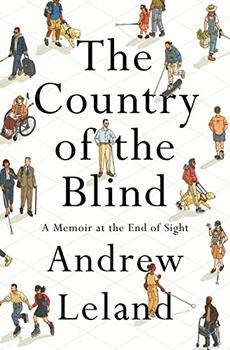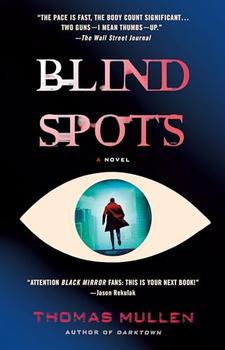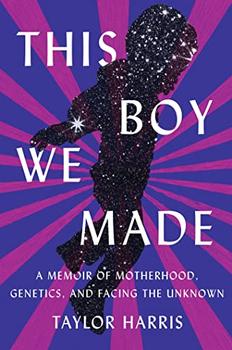Summary | Excerpt | Reviews | Beyond the book | Read-Alikes | Genres & Themes | Author Bio

 Book Reviewed by:
Book Reviewed by:
Rebecca Foster
Buy This Book
A witty, winning, and revelatory personal narrative of the author's transition from sightedness to blindness and his quest to learn about blindness as a rich culture all its own
We meet Andrew Leland as he's suspended in the liminal state of the soon-to-be blind: he's midway through his life with retinitis pigmentosa, a condition that ushers those who live with it from sightedness to blindness over years, even decades. He grew up with full vision, but starting in his teenage years, his sight began to degrade from the outside in, such that he now sees the world as if through a narrow tube. Soon—but without knowing exactly when—he will likely have no vision left.
Full of apprehension but also dogged curiosity, Leland embarks on a sweeping exploration of the state of being that awaits him: not only the physical experience of blindness but also its language, politics, and customs. He negotiates his changing relationships with his wife and son, and with his own sense of self, as he moves from his mainstream, "typical" life to one with a disability. Part memoir, part historical and cultural investigation, The Country of the Blind represents Leland's determination not to merely survive this transition but to grow from it—to seek out and revel in that which makes blindness enlightening.
Thought-provoking and brimming with warmth and humor, The Country of the Blind is a deeply personal and intellectually exhilarating tour of a way of being that most of us have never paused to consider—and from which we have much to learn.
Excerpt
The Country of the Blind
The Argentinian writer Jorge Luis Borges lost his vision—what he called his "reader's and writer's sight"—around the same time that he became the director of the National Library of Argentina. This put him in charge of nearly a million books, he observed, at the very moment he could no longer read them.
Borges, who went blind after a long decline in vision when he was fifty-five, never learned braille. Instead, like Milton, he memorized long passages of literature (his own, and those of the writers he loved), and had companions who read to him and to whom he dictated his writing.
Much of this work—he published nearly forty books after he went blind—was done by his elderly mother, Leonor, with whom he lived until her death at ninety-¬nine, and who had done the same work for Borges's father, Jorge Guillermo Borges, a writer who also went blind in middle age. (Borges's blindness was hereditary, and his father and grandmother ...
The book is wide-ranging, which some readers may appreciate, but those who pick it up mostly for the autobiographical element may find the profusion of detail on assistive and medical technologies, activists and organizations overwhelming. It is most engaging when we get glimpses of Leland's own blindness journey or go along with him on his travels, such as to a National Federation of the Blind convention in Florida and to one of its residential training courses in Colorado, where he was given sleep shades to simulate total blindness and received lessons in cooking and cleaning. As well as giving a practical rundown of the various causes of blindness and attempts to mitigate it, the book launches a philosophical enquiry into what it means. Is it a formative trait, or something to be resisted?..continued
Full Review
 (722 words)
(722 words)
(Reviewed by Rebecca Foster).
 Chloé Cooper Jones, author of Easy Beauty
Andrew Leland has written an important and masterful book, one filled with deep thought and feeling, vulnerability and humor, and absolutely gorgeous prose. Rare is the writer who can gift the reader the kind of expansive generosity The Country of the Blind offers with ease on every page.
Chloé Cooper Jones, author of Easy Beauty
Andrew Leland has written an important and masterful book, one filled with deep thought and feeling, vulnerability and humor, and absolutely gorgeous prose. Rare is the writer who can gift the reader the kind of expansive generosity The Country of the Blind offers with ease on every page. Dave Eggers, author of The Circle and A Heartbreaking Work of Staggering Genius
This is such a gorgeous book. Andrew Leland manages to deftly balance the personal, historical and political as he documents—documents is too sterile a word; he gently sings about—his becoming blind. There is a great nonfiction book here about the history of blindness and the pioneers who have built a world of access and empowerment. But crucially, Leland weaves into that larger tapestry the deeply touching story of how he, his wife Lily, and his son Oscar face their myriad new challenges—with open minds and abundant wit, and always fearlessly together.
Dave Eggers, author of The Circle and A Heartbreaking Work of Staggering Genius
This is such a gorgeous book. Andrew Leland manages to deftly balance the personal, historical and political as he documents—documents is too sterile a word; he gently sings about—his becoming blind. There is a great nonfiction book here about the history of blindness and the pioneers who have built a world of access and empowerment. But crucially, Leland weaves into that larger tapestry the deeply touching story of how he, his wife Lily, and his son Oscar face their myriad new challenges—with open minds and abundant wit, and always fearlessly together. Joshua Cohen, Pulitzer Prize-winning author of The Netanyahus
Leland writes with astounding humor and humility about ability, disability, the confusions between them, the confusions of middle age, marriage, and parenthood, language in all its beauty and bias, and more to the n-th power. Approaching what he calls the end of sight, he has summoned up that higher vision.
Joshua Cohen, Pulitzer Prize-winning author of The Netanyahus
Leland writes with astounding humor and humility about ability, disability, the confusions between them, the confusions of middle age, marriage, and parenthood, language in all its beauty and bias, and more to the n-th power. Approaching what he calls the end of sight, he has summoned up that higher vision. Temple Grandin, author of Visual Thinking
In The Country of the Blind, Andrew Leland tells the story of his gradual transition into the blindness community with sensitivity and insight. He vividly describes his new sensory perceptions and emotions and outlines controversies about the training of the blind. His experiences will resonate powerfully with those in the autism community and beyond. A valuable book.
Temple Grandin, author of Visual Thinking
In The Country of the Blind, Andrew Leland tells the story of his gradual transition into the blindness community with sensitivity and insight. He vividly describes his new sensory perceptions and emotions and outlines controversies about the training of the blind. His experiences will resonate powerfully with those in the autism community and beyond. A valuable book. In The Country of the Blind, Andrew Leland sings the praises of Bookshare, an electronic repository of accessible-format books for the disabled. Bookshare was launched in 2001 by Jim Fruchterman, the leader of Benetech, a Palo Alto-based nonprofit that develops technologies to assist those with physical and learning disabilities. The Bookshare mission is stated thus: "Bookshare makes reading easier. People with dyslexia, blindness, cerebral palsy, and other reading barriers can customize their experience to suit their learning style and find virtually any book they need for school, work, or the joy of reading."
In The Country of the Blind, Andrew Leland sings the praises of Bookshare, an electronic repository of accessible-format books for the disabled. Bookshare was launched in 2001 by Jim Fruchterman, the leader of Benetech, a Palo Alto-based nonprofit that develops technologies to assist those with physical and learning disabilities. The Bookshare mission is stated thus: "Bookshare makes reading easier. People with dyslexia, blindness, cerebral palsy, and other reading barriers can customize their experience to suit their learning style and find virtually any book they need for school, work, or the joy of reading."
Bookshare can be joined by paying a subscription fee or, often, via subsidization by governments or charitable bodies. The U...

If you liked The Country of the Blind, try these:

by Thomas Mullen
Published 2024
A riveting crime novel with a speculative edge about the ways our perceptions of reality can be manipulated.

by Taylor Harris
Published 2023
A Black mother bumps up against the limits of everything she thought she believed - about science and medicine, about motherhood, and about her faith - in search of the truth about her son.





The Flower Sisters
by Michelle Collins Anderson
From the new Fannie Flagg of the Ozarks, a richly-woven story of family, forgiveness, and reinvention.

The House on Biscayne Bay
by Chanel Cleeton
As death stalks a gothic mansion in Miami, the lives of two women intertwine as the past and present collide.

The Funeral Cryer by Wenyan Lu
Debut novelist Wenyan Lu brings us this witty yet profound story about one woman's midlife reawakening in contemporary rural China.
Your guide toexceptional books
BookBrowse seeks out and recommends the best in contemporary fiction and nonfiction—books that not only engage and entertain but also deepen our understanding of ourselves and the world around us.